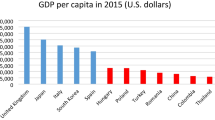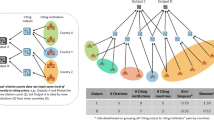Abstract
Using data for the period 2000 to 2019, the aim of this paper is to profile and compare research publications in regions and continents. The empirical evidence is based on the Poisson regression model, quantile regression for counts data and panel negative binomial regression. The findings can be summarised as follows: continuous and linear increasing trends in the production of knowledge are noted in developing regions specifically in Africa even if the contribution of the continent to global research is marginal. In countries with least production, ‘internet users’ is not significant but schooling modulates its effect on research production contrarily to countries in the upper part of the distribution. In Africa, if the number of schooling years increases by one, the number of documents or published works produced is expected to increase by a factor of 1.147.



Similar content being viewed by others
Notes
Documents and published works are used interchangeably.
References
Acha-Anyi, A., Acha-Anyi, P. N., Asongu, S. A. & Tchamyou, V. S. (2020). Social media for health promotion: A visual analysis of “TB proof” South Africa’s Facebook page. Technology in Society, 60(1), 101386.
Albuquerque, E. M. (2000). Scientific infrastructure and catching-up process: Notes about a relationship illustrated by science and technology statistics, The Latin American and Caribbean Economic Association.
Asongu, S. A. (2013a). Modeling the future of knowledge economy: Modeling the future of knowledge economy: Evidence from SSA and MENA countries. Economics Bulletin, 33(1), 612–624.
Asongu, S. A. (2013b). The ‘Knowledge Economy’-finance nexus: How do IPRs matter in SSA and MENA countries? Economics Bulletin, 33(1), 78–94.
Asongu, S. A. (2017a). Knowledge economy gaps, policy syndromes and catch-up strategies: Fresh South Korean lessons to Africa. Journal of the Knowledge Economy, 8(1), 211–253.
Asongu, S. A. (2017b). The comparative economics of knowledge economy in Africa: Policy benchmarks, syndromes, and implications. Journal of Knowledge Economy, 8(2), 596–637.
Asongu, S. A., & Nwachukwu, J. C. (2016). A brief future of time in the monopoly of scientific knowledge. Comparative Economic Studies, 58(4), 638–671.
Asongu, S. A., & Nwachukwu, J. C. (2019). PhD by publication as an argument for innovation and technology transfer: With emphasis on Africa. Higher Education Quarterly, 72(1), 15–28.
Balconi, M., Brusoni, S., & Orsenigo, L. (2010). In defense of the linear model: An essay. Research Policy, 39(1), 1–13.
Broström, A., Buenstorf, G., & McKelvey, M. (2020). The knowledge economy, innovation and the new challenges to universities: Introduction to the special issue. Innovation, Organization & Management, 23(2), 145–162.
Chandra, D. S., & Yokoyama, K. (2011). The role of good governance in the knowledge-based economic growth of East Asia — A study on Japan, newly industrialized economies. Graduate School of Economics, Kyushu University.
Dastile, N. P., & Ndlovu-Gatsheni, S. J. (2013). Power, knowledge and being: Decolonial combative discourse as a survival kit for Pan-Africanists in the 21st century. Alternation, 20(1), 105–134.
D’Este, P., & Patel, P. (2007). University-industry linkages in the UK: What are the factors underlying the variety of interactions with industry? Research Policy, 36(9), 1295–1313.
Kim, L., & Nelson, R. (2000). Technology, learning and innovation: Experiences of newly industrializing economies. Cambridge University Press.
Machado, J. A., & Santos-Silva, J. M., (2005). Quantiles for counts. Journal of the American Statistical Association, 100(472), 1226–1237.
Mazzoleni, R. (2008). Catching up and academic institutions: A comparative study of past national experiences. The Journal of Development Studies, 44(5), 678–700.
Mazzoleni, R., & Nelson, R. (2007). Public research institutions and economic catch-up. Research Policy, 36(10), 1512–1528.
Mignolo, W. D., & Walsh, C. E. (2018). On decoloniality. Duke University Press.
Morrison, A., Cassi, I., & Rabellotti, R. (2009). Catching-up countries and the geography of science in the wine industry, Copenhagen Business School, 2009 Summer Conference.
Mowery, D. C., &Sampat, B. N. (2005). Universities and innovation, The Oxford Handbook on Innovation Ed. Fagerberg, J. Mowery, D., and Nelson, R., Oxford University Press.
Nachega, J. B., Uthman, O. A., Ho, Y. S., et al. (2012). Current status and future prospects of epidemiology and public health training and research in the WHO African region. International Journal of Epidemiology, 41, 1829–1846.
Puplampu, K. P., & Mugo, S. M. (2020). Disruptive technology and knowledge development: African universities, human capital and educating for global citizenship. In: Arthur P., Hanson K., Puplampu K. (eds) Disruptive Technologies, Innovation and Development in Africa. International Political Economy Series. Palgrave Macmillan, Cham.
Quijano, A. (2000). Coloniality of power and eurocentricism in Latin America. Duke University Press, North Carolina.
Tchamyou, V. S. (2017). The role of knowledge economy in African business. Journal of the Knowledge Economy, 8(4), 1189–1228.
Tchamyou, V. S. (2019). The role of information sharing in modulating the effect of financial access on inequality. Journal of African Business, 20(3), 317–338.
Tchamyou, V. S. (2020). Education, lifelong learning, inequality and financial access: Evidence from African countries. Contemporary Social Science, 15(1), 7–25.
Tchamyou, V. S., & Asongu, S. A. (2017). Information sharing and financial sector development in Africa. Journal of African Business, 18(7), 24–49.
Uthman, O. A., Wiysonge, C. S., Ota, M. O., Nicol, M., Hussey, G. D., Ndumbe, P. M., & Mayosi, B. M. (2014). Increasing the value of health research in the WHO African Region beyond 2015—Reflecting on the past, celebrating the present and building the future: A bibliometric analysis. British Medical Journal Open, 2015(5), e006340. https://doi.org/10.1136/bmjopen-2014-006340
Weber, A. S. (2011). The role of education in knowledge economies in developing countries. Procedia Social and Behavioral Sciences, 15, 2589–2594.
World Bank. (2007). Building knowledge economies. Advanced Strategies for Development. World Bank Institute Development Studies.
Acknowledgements
The authors are indebted to the editor and reviewers for constructive comments.
Author information
Authors and Affiliations
Corresponding author
Additional information
Publisher's Note
Springer Nature remains neutral with regard to jurisdictional claims in published maps and institutional affiliations.
Rights and permissions
About this article
Cite this article
Diop, S., Asongu, S.A. Research Productivity: Trend and Comparative Analyses by Regions and Continents. J Knowl Econ 14, 1503–1521 (2023). https://doi.org/10.1007/s13132-022-00934-x
Received:
Accepted:
Published:
Issue Date:
DOI: https://doi.org/10.1007/s13132-022-00934-x




